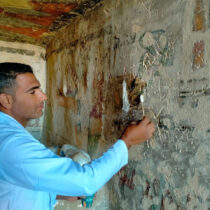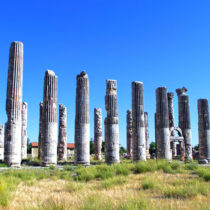The symposium “Cultural Continuity, Change and Interaction in the Aegean World from the second to first millenium BC” will be hosted online by DEÜ Archaeology and Archeometry Application and Research Center in Turkey on 17-18 November 2022 via Zoom platform.
The symposium languages are English and Turkish. The presentations will be 20 minutes.
All abstracts should not exceed 300 words and include name, title and institution.
Abstracts should be sent to [email protected]
Deadline to send the abstracts: 15.08.2022
Announcement of the accepted papers: 01.09.2022
Contact info [email protected]
Topics
– Theoretical Approaches and Concepts
- Defining the concepts of Cultural Interaction, Communication, Tradition, Exchange, etc.
- Defining continuities or interruptions and changes in traditions (architecture, cult, burial customs, pottery etc.) over a region or settlement in the Aegean World.
- Theories about Social Organization and State Formation in the Aegean World
- Comparative chronology table and introduction of regional cultural groups
The Role of Cultural Interaction on Social Structure
Regional assessments. During the 2nd millennium BC, at a certain period of the 2nd millennium BC or in the transition to the 1st millennium BC, the social structure of the micro or macro-scale areas within the regions mentioned below, which have similar and general characteristics within themselves, will be focused on in the context of cultural interaction. Archaeological surveys can be evaluated under this scope.
-Western Anatolia and Inner Western Anatolia
-All Aegean Islands
-Mainland Greece (Thessaly, Central Greece, Peloponnese)
-Northern Aegean (Northern Macedonia, Western and Eastern Thrace, Northern Aegean Islands, and Troas)
Traditions and Changes in the Excavated Settlements
-A holistic description of the practices or traditions that continued in a settlement during the 2nd Millennium BC and the transition to the 1st Millennium BC, in the light of archaeological and archaeometric findings such as architecture, pottery, small finds and burial.
-The extent to which the settlement reflects the local characteristics of the cultural region in which it is located and the periodic changes of these characteristics, if any.
-Local and/or traditional practices that were abandoned or changed, transformed and developed during the period.
-If there is, the definition and periodical stages of foreign cultural elements in the settlement.
The reasons for the ongoing and non-continuing traditional local practices and changes in the settlement and their evaluation in the context of cultural interaction.
Architecture
-External influences and cultural interaction in civil, military and religious architecture in the Aegean World
The need for defense and fortified settlements in the transition from the 2nd to the 1st millennium BC
Pottery Traditions
-Different pottery traditions in the 2nd Millennium BC and the transition to the 1st Millennium BC in the Aegean World.
-Foreign influences on local potterty. Cultural interaction through pottery. Local and homeland influences on pottery in the newly settled region with migrations – Cults and Burial Traditions
-Their possible roles in local cults, religious activities and cultural interactions in the 2nd Millennium BC and the transition to the 1st Millennium BC in the Aegean World.
-Different burial customs in the Aegean World
-Similarities, imitation and interaction through tomb types and tomb gifts from Greece to Western Anatolia in the transition to the 2nd and 1st Millennium BC.
The impact of mass migrations on burial customs
Craftsmanship
-Cultural interaction in the Aegean World through craftsmanship
-Continuation of some traditions and changes in craftsmanship
-Production of artifacts by using foreign raw materials transported from different regions to the Aegean World by local craftsmen
-Transfer of imagination and some production techniques outside the Aegean World
Scientific board
– Prof.Dr. Engin AKDENİZ
– Prof.Dr. Eşref ABAY
– Prof.Dr. Rüstem ASLAN
– Prof.Dr. Şengül AYDINGÜN
– Prof.Dr. Ayşegül AYKURT
– Prof.Dr. Massimo CULTRARO
– Prof.Dr. Özlem ÇEVIK
– Prof.Dr. Adnan DİLER
– Prof.Dr. Sevinç GÜNEL
– Prof.Dr. Barbara HOREJS
– Prof.Dr. Kaan İREN
– Prof.Dr. Robert KOEHL
– Prof.Dr. Peter PAVUK
– Prof.Dr. Göksel SAZCI
– Prof.Dr. Turan TAKAOĞLU
– Prof.Dr. Andreas G. VLACHOPOULOS
– Prof.Dr. Remzi YAĞCI
– Prof.Dr. Assaf YASUR-LANDAU
– Assoc. Prof.Dr. Zafer DERİN
– Assoc. Prof.Dr. Aylin ERDEM
– Assoc. Prof.Dr. Erkan FİDAN
– Assoc. Prof. Dr. Barış GÜR
– Assoc. Prof. Dr. Fulya Dedeoğlu KONAKÇI
– Assoc. Prof. Dr. Erim KONAKÇI
– Assoc. Prof. Dr. Deniz SARI
– Assoc. Prof. Dr. Murat TÜRKTEKİ
– Assist. Prof.Dr. Meral Başaran MUTLU
– Dr. Efi KARANTZALI
– Dr. Kostas PASCHALIDIS
Executive board
– Prof.Dr. Engin AKDENİZ
– Assoc. Prof.Dr. Barış GÜR
– Assoc. Prof.Dr, Tuna AKÇAY
– Assist. Prof.Dr. Meral Başaran MUTLU





